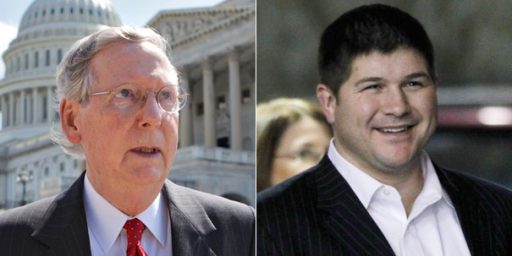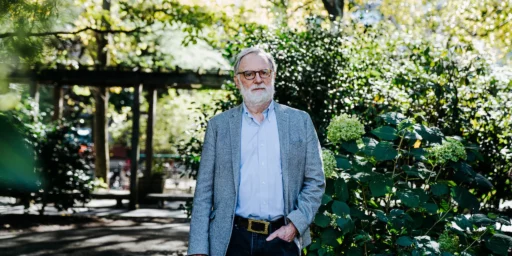College Professors as Generalists
Thomas Benton reflects at the Chronicle of Higher Education about the nature of college teaching.
Out of the 50 or so courses I have taught in my current position, no more than a third have been related to the fields for which I trained in graduate school and on which all of my scholarly publications have focused.
I am not complaining. I am grateful for the experience, which is probably typical for professors who are not employed by research universities. In many respects, teaching outside my field — mostly general-literature courses and surveys of Western civilization — has refined and deepened the education I only half received as an undergraduate.
My transformation from a specialist into a generalist has not been easy. Under the pressure of teaching 12 credits a semester — sometimes a dozen different topics a week — I have had to take a few short-cuts.
One of those shortcuts is the use of mass market pre-recorded lectures from “famous professors.” Indeed, they are the subject of his essay. I’ve never used them and am skeptical about the value of lecture without live interaction but will otherwise leave that subject to Benton and the reader.
The fact that most college professors spend much of their teaching time on classes outside their true expertise — which certainly mirrors my experience — is a subject I find far more interesting. And Benton is quite right: oftentimes, professors have relatively short periods to learn to teach subjects about which they have little knowledge or prior interest. Indeed, my first semester as a full-time teacher required me to teach a course in Political Psychology, a subject about which I was theretofore unaware even existed. (This extreme is slightly atypical. I was a last-minute sabbatical replacement hire for a professor who had received a research grant.)
As it turned out, I knew quite a bit more about Political Psychology than I realized, having learned perhaps 90 percent of the material under different names as part of dozens of other courses I had taken, books I’d read, and so forth. And the PhD is, after all, a research degree, so I had little trouble getting myself up to sufficient speed that I was able to competently answer any question an undergraduate without my years of preparation would be able to think up. Still, there were definitely times I felt like a fraud having to masquerade as an “expert” when I was merely fairly knowledgeable.
Outside the research universities, where professors tend to teach no more than three or four courses a year, usually repeating no more than five or six total courses over and over, there’s no way to escape this phenomenon. And at the research universities, the survey courses taught to non-majors are usually taught by non-expert graduate students.
The danger, though, is that professors quickly figure out that they have expertise that’s wide and deep enough to fake their way through undergraduate teaching and therefore stop investing much time in preparing for their classes. My conscience is relatively clear in that regard, although I certainly spent less time preparing toward the end of my teaching career as compared to my first three or four years. But, as Benton alludes to, the rewards of the academy as mostly for things other than teaching well, especially at the undergraduate level.
UPDATE: In the comments, Triumph makes the excellent point that the primary object of a college education is “developing critical thinking and analytical and communications skills” and that therefore, “The subject at hand–whether it be American government, Russian literature, or statistics–is less important than having fundamental analytical skills.” I agree wholeheartedly. That said, it’s difficult to use a class to impart those skills without at least a reasonable background in the subject matter at hand.






Which raises the question of how efficient is the current system. Would education be better served by having the real experts do the lecture world wide (e.g. over the Internet), with tiers of students. Those who are in the physical location, those who get it live and can ask real time questions, those who can ask time delayed questions and those who see the lecture “canned”.
Are you better served learning from someone who is “winging it” while breathing the same air as that person or getting the lecture remotely from a true expert (who might also combine the advantages of expertise with good teaching skills). Plus the beauty of being able to catch a missed lecture.
Two problems: Lecturing isn’t teaching and teaching isn’t scalable.
There are no doubt plenty of people who are both experts and spellbinding orators. They are the ideal teacher, really. But they can’t pass on their teaching via a series of recorded lectures, nor can then reasonably handle communication with hundreds or thousands of students.
If recording good lectures is all there is to teaching, we could just close all the universities and have students watch the Discovery Channel, History Channel, and so forth.
I think you are missing the point of good college teaching. Sure, you need to impart information on basic topics and subject.
But the big thing, however, is developing critical thinking and analytical and communications skills. In this sense, the fact that you’re a “generalist” vs. “specialist” is less important than your ability to offer critique and guidance in the realm of critical thinking and communication. The subject at hand–whether it be American government, Russian literature, or statistics–is less important than having fundamental analytical skills.
I can’t help but notice the parallel between the non-expert teacher and my occasional experience as a consultant in the software development arena.
There are times when requirements and resources don’t quite match up, so the consultant has to go on a crash course of understanding a particular programming language, server software or some other aspect of information technology. The key is for the consultant to always stay just ahead of the client’s staff, so he remains the “expert” in the client’s eyes.
Not that I would ever endorse such an approach. Ahem.
I had the same experience as James…although my Ph.D. is in political science, I spent much of my academic career teaching comparative religion, philosophy, literature, American and world history, and economics.
As a regular adjunct at one university, the political theorist in the department was bumped upstairs to a dean’s position and I taught his political theory courses two or three times…I was quite proud when he told me that he didn’t want anyone else to teach them but me, despite the fact that theory wasn’t one of my major fields and I really didn’t enjoy the subject matter very much!